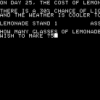Specs:
Engine: Unity Pro
Language: JavaScript
Modelling: Blender
Texturing: PS and Allegorithmic Indie Suite
Platform: PC and Mac (Windows 7/8/8.1 and OSX)
Team-
Art Assets and Concept by Jeff W. (About 2 years of modeling experience.)
Programming and Networking by Jack H. (About 1.5 years of programming experience.)
Special thanks to Brian H. (Lifetime of quality control experience.)
(A bit of an inexperienced team, but we learn fast.)
Main Concept:
The unnamed game is a class based multiplayer FPS and building game. Twelve or more players are split into two teams at the beginning of the game. Each team is in control of one ‘business.’ The businesses are represented by two buildings sitting on either sides of a playing field. The actual environment for the playing field has yet to be decided. The goal of the game is to bankrupt the enemy business. This is done by attacking the enemy business in a number of different ways. Businesses can commit acts of corporate espionage, assassinate enemy players, plant bombs in enemy business and a number of other options. At the same time, players can benefit their own businesses by building defenses on their own teams building. Buildings can include traps, protective walls, and other security measures on their own business. Every action that a business does (either by sabotaging the enemy business, or building on to their own) grants them money from investors. Investors will pay a business when it is doing well, but will stop investing in the company if their enemy’s are sabotaging them. For instance, in a player on team A assassinates a player on team B, investors for team A will award team A with money, while investors will hold on investing on team B. For another example, maybe a player on team B builds security cameras in the base of team B, investors will award the business money for making defenses. However, money awarded through defensive manners will not make investors on team A stop investing, since this does not directly hurt team A. However, offensive measures such as corporate espionage, bombings, and assassinations will award the offensive team money, while prompting investors on the attacked team to stop investing. The game ends when one team runs out of money, and is too dysfunctional to earn money from investors.
*I hope that I haven’t written this in a way that isn’t too confusing. I’m not the best at getting my ideas down on paper. Thanks for sticking with it*
Classes:
Players will choose classes at the beginning of the game. Some classes have a limit on them, and some do not. However, it is wise for a team to spread their players across multiple classes, because a single class heavy team won’t be able to function. The game relies heavily on teamwork and communication, so an in game voice communication as well as a text communication system will be implemented.
Class List-
Executive: There can only be one executive per team. The Executive is in charge of commanding his/her team. They are in charge of logistics and supplies. For example, the Executive is in charge of ordering weapon shipments for the offensive classes, or ordering building materials for the defensive classes. The Executive can also invest in the stock market. The stock market is a system in the game in which the Executive can invest money, and hopefully make a profit. The investment system will be fleshed out in a later iteration of this concept.
Offensive: The offensive class is basically a soldier/security guard. They are given weapons that range from sniper rifles to shotguns depending on what their executive orders for them. Their main task is to make sure that no corporate espionage acts/assassinations are committed inside the business, but to attack and try and damage the enemy business.
Defensive: This class is in charge of building onto their business. They can construct anything in their base from traps, to cannons for bombarding the enemy business. They must use building materials that are ordered in shipments by their executive. The defensive class is very important in preventing espionage within their own base.
Agent: This class is is the spy of the game. They can commit acts of espionage that range from sabotaging shipments to the enemy company, to wiring security cameras to reroute to their base, letting their Executive know what’s going on the enemy base.
I know this concept is unfinished, but I hope to finish the full version sometime soon. I just wanted to get this idea on paper, and see what everyone had to say about it. Thanks for reading if you finished it, I know it was a bit on the long side. Any comments/criticism are welcomed. (TF2 ripoff comments as well.) Thanks!









